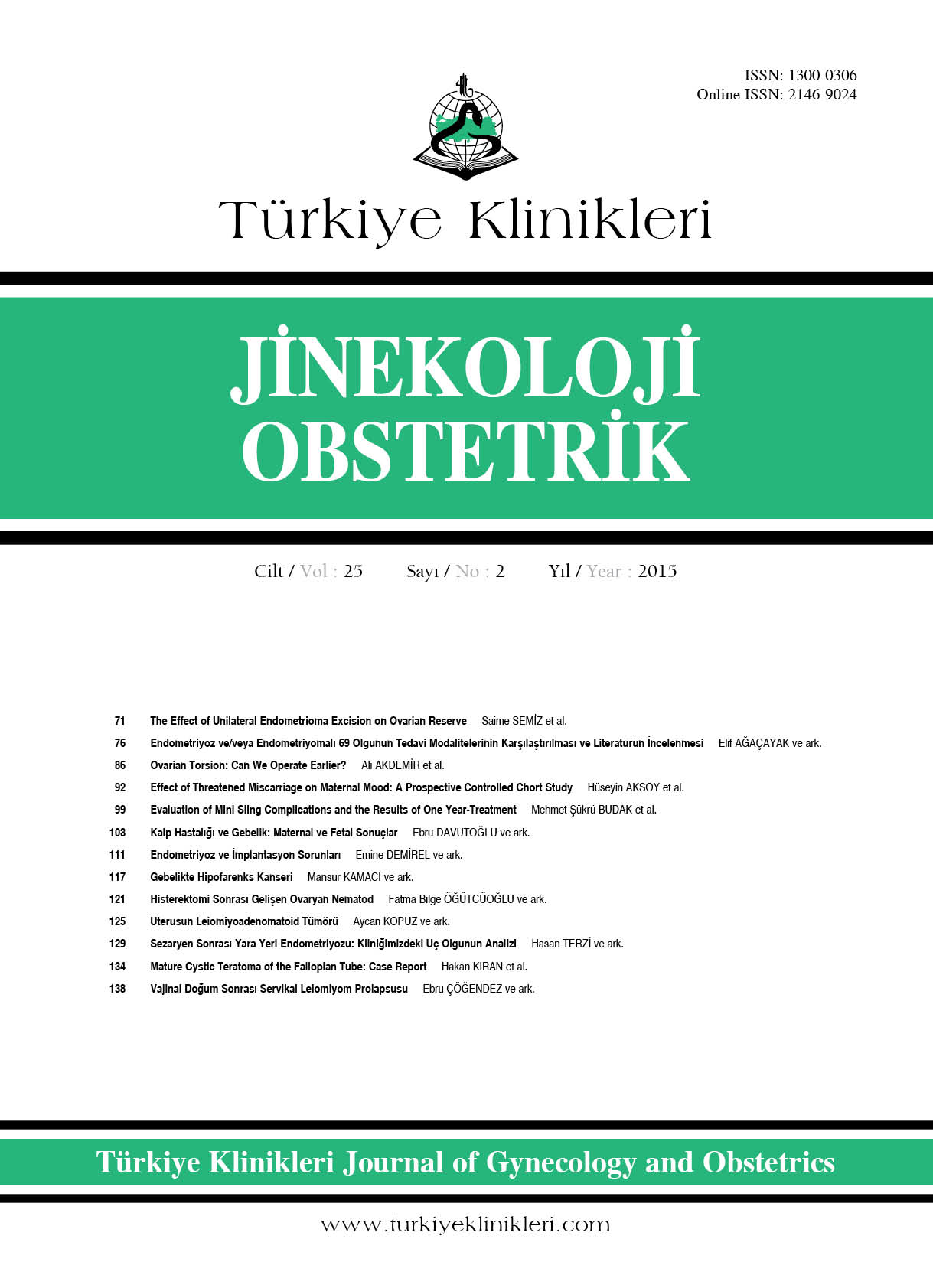Open Access
Peer Reviewed
ORIGINAL RESEARCH
3102 Viewed1823 Downloaded
Heart Disease and Pregnancy: Maternal and Fetal Outcomes
Kalp Hastalığı ve Gebelik: Maternal ve Fetal Sonuçlar
Turkiye Klinikleri J Gynecol Obst. 2015;25(2):103-10
DOI: 10.5336/gynobstet.2014-43155
Article Language: TR
Article Language: TR
Copyright Ⓒ 2020 by Türkiye Klinikleri. This is an open access article under the CC BY-NC-ND license (http://creativecommons.org/licenses/by-nc-nd/4.0/)
ÖZET
Amaç: Kalp hastalığıyla komplike olan gebeliklerde maternal ve fetal sonuçların değerlendirilmesidir. Gereç ve Yöntemler: 1997-2012 yılları arasında gebe polikliniğinde antenatal takipleri yapılmış ve doğumunu yine bu merkezde gerçekleştirmiş, kalp hastalığı olan 222 gebenin dosyası retrospektif olarak incelendi. Kalp hastalığının türüne ve New York Kalp Derneği [New York Heart Association (NYHA)]'nin kardiyak durum fonksiyonel sınıflamasına göre maternal ve perinatal sonuçlar değerlendirildi. Bulgular: Romatolojik ve konjenital kalp hastalıklarının yüzdesi sırasıyla %76,1 ve %15'tir. NYHA'nın fonksiyonel sınıflandırmasına göre hastaların dağılımı NYHA Sınıf I için 117 (%52,7), Sınıf II için 87 (%39,1), sınıf III ve IV için 18 (%8,2)'dir. İki maternal mortalite olgusu kaydedilmiştir. Maternal morbidite 31 (%13,9) olguda izlenmiştir. Perinatal mortalitenin olduğu 7 (%3,1) olgu kaydedilmiştir. Sezaryen, vakum ve forsepsle doğum açısından NYHA Sınıf I-II ve NYHA Sınıf III-IV arasında istatistiksel açıdan anlamlı bir fark yoktur (p=0,605). Ancak doğum ağırlığı, doğumdaki gestasyonel hafta, perinatal mortalite, maternal morbidite ve mortalite açısından istatistiksel olarak anlamlı fark bulunmuştur (sırasıyla p=0,023, 0,001, 0,035, 0,001 ve 0,024). Sonuç: Gelişmekte olan ülkelerde gebeliği komplike eden kalp hastalıklarının büyük çoğunluğunu romatizmal kalp hastalıkları oluşturmaktadır. Hastaların çoğunluğu uygun fonksiyonel sınıfta yer almaktadır ve maternal morbidite maternal kardiyak fonksiyonel sınıflandırma ile yakından ilişkilidir.
Amaç: Kalp hastalığıyla komplike olan gebeliklerde maternal ve fetal sonuçların değerlendirilmesidir. Gereç ve Yöntemler: 1997-2012 yılları arasında gebe polikliniğinde antenatal takipleri yapılmış ve doğumunu yine bu merkezde gerçekleştirmiş, kalp hastalığı olan 222 gebenin dosyası retrospektif olarak incelendi. Kalp hastalığının türüne ve New York Kalp Derneği [New York Heart Association (NYHA)]'nin kardiyak durum fonksiyonel sınıflamasına göre maternal ve perinatal sonuçlar değerlendirildi. Bulgular: Romatolojik ve konjenital kalp hastalıklarının yüzdesi sırasıyla %76,1 ve %15'tir. NYHA'nın fonksiyonel sınıflandırmasına göre hastaların dağılımı NYHA Sınıf I için 117 (%52,7), Sınıf II için 87 (%39,1), sınıf III ve IV için 18 (%8,2)'dir. İki maternal mortalite olgusu kaydedilmiştir. Maternal morbidite 31 (%13,9) olguda izlenmiştir. Perinatal mortalitenin olduğu 7 (%3,1) olgu kaydedilmiştir. Sezaryen, vakum ve forsepsle doğum açısından NYHA Sınıf I-II ve NYHA Sınıf III-IV arasında istatistiksel açıdan anlamlı bir fark yoktur (p=0,605). Ancak doğum ağırlığı, doğumdaki gestasyonel hafta, perinatal mortalite, maternal morbidite ve mortalite açısından istatistiksel olarak anlamlı fark bulunmuştur (sırasıyla p=0,023, 0,001, 0,035, 0,001 ve 0,024). Sonuç: Gelişmekte olan ülkelerde gebeliği komplike eden kalp hastalıklarının büyük çoğunluğunu romatizmal kalp hastalıkları oluşturmaktadır. Hastaların çoğunluğu uygun fonksiyonel sınıfta yer almaktadır ve maternal morbidite maternal kardiyak fonksiyonel sınıflandırma ile yakından ilişkilidir.
ANAHTAR KELİMELER: Gebelik; kalp hastalıkları
ABSTRACT
Objective: To evaluate the maternal and fetal outcome of pregnancies complicated by cardiac diseases. Material and Methods: A retrospective analysis of 222 pregnancies of women with cardiac disease who received antenatal care and were delivered in the obstetrics department of a tertiary care center between 1997 and 2012 was carried out. Perinatal and maternal outcomes were evaluated according to the type of the heart diseases and cardiac status of the patients according to the New York Heart Association (NYHA) functional classification. Results: The percentage of rheumatic and congenital heart diseases were 76.1% and 15% respectively. The distribution of the patients according to the NYHA functional classification were 117 (52.7%), 87(39.1%) and 18(8.2%) for NYHA classes I, II and III-IV respectively. Two cases of maternal mortality were recorded. Maternal morbidity was observed in 31 (13.9%) cases. seven cases of perinatal mortality (3.1%) were also recorded. There were no statistical significance between NYHA Stage I-II and Stage III-IV groups in terms rates of cesarean, vacuum or forceps deliveries (p=0.605), whereas mean values birth weight, gestational age at delivery, mean birth weight, incidence of perinatal morbidity, maternal morbidity and mortality were significantly higher in NYHA Stage III-IV group (p=0.023, 0.001, 0.035, 0.001 ve 0.024 respectively). Conclusion: Rheumatic heart diseases constitute the most predominant group of cardiac diseases to complicate pregnancies in developing countries. The majority of patients are found to be in favorable functional classification and maternal morbidity strongly correlates with maternal cardiac functional classification.
Objective: To evaluate the maternal and fetal outcome of pregnancies complicated by cardiac diseases. Material and Methods: A retrospective analysis of 222 pregnancies of women with cardiac disease who received antenatal care and were delivered in the obstetrics department of a tertiary care center between 1997 and 2012 was carried out. Perinatal and maternal outcomes were evaluated according to the type of the heart diseases and cardiac status of the patients according to the New York Heart Association (NYHA) functional classification. Results: The percentage of rheumatic and congenital heart diseases were 76.1% and 15% respectively. The distribution of the patients according to the NYHA functional classification were 117 (52.7%), 87(39.1%) and 18(8.2%) for NYHA classes I, II and III-IV respectively. Two cases of maternal mortality were recorded. Maternal morbidity was observed in 31 (13.9%) cases. seven cases of perinatal mortality (3.1%) were also recorded. There were no statistical significance between NYHA Stage I-II and Stage III-IV groups in terms rates of cesarean, vacuum or forceps deliveries (p=0.605), whereas mean values birth weight, gestational age at delivery, mean birth weight, incidence of perinatal morbidity, maternal morbidity and mortality were significantly higher in NYHA Stage III-IV group (p=0.023, 0.001, 0.035, 0.001 ve 0.024 respectively). Conclusion: Rheumatic heart diseases constitute the most predominant group of cardiac diseases to complicate pregnancies in developing countries. The majority of patients are found to be in favorable functional classification and maternal morbidity strongly correlates with maternal cardiac functional classification.
MENU
POPULAR ARTICLES
MOST DOWNLOADED ARTICLES





This journal is licensed under a Creative Commons Attribution-NonCommercial-NoDerivatives 4.0 International License.











